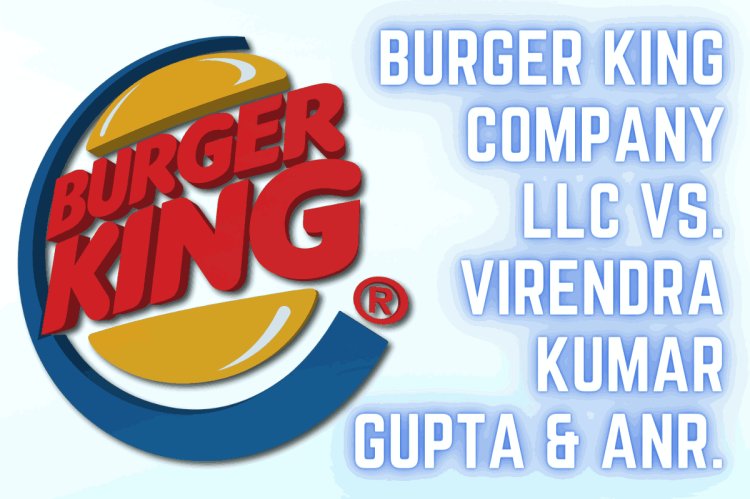Burger King Company LLC v. Virendra Kumar Gupta & Anr.
This case involves Burger King Company LLC's legal action against "Burger King Family Restaurant" for trademark infringement and passing off. Burger King sought cancellation of the defendant's trademark registrations and a permanent injunction, asserting its ownership of the "Burger King" trademark since 1954. The defendants claimed prior use and argued the mark's genericness. The court, recognizing Burger King's mark as well-known, restrained the defendants from using it but allowed the use of "Burger Emperor." The case underscores the importance of evidence in trademark disputes and the protection of intellectual property rights.

Burger King Company LLC v. Virendra Kumar Gupta & Anr.
2023 SCC OnLine Del 2292,
Decided on 21/04/2023
Brief Facts of the Case:
Burger King Company LLC filed three cancellation petitions under Section 57 of the Trade Marks Act (TMA) and a suit under Section 134 of the TMA (passing off) against the defendants. The defendants were operating their business under the name and trading style of "Burger King Family Restaurant." The Plaintiff sought a permanent injunction and declaration of the mark 'Burger King' as a well-known mark. Additionally, the Plaintiff sought relief against the defendants for their unauthorized use of the mark.
Contentions of the Plaintiff:
The plaintiff put forward a claim that they are the rightful owner of the 'Burger King trademark since 1954. The plaintiff further asserted that this trademark has been used extensively in over 100 countries and has garnered a considerable amount of sales and investments in promotion. The plaintiff argued that the defendant's use of the same trademark was in violation of their intellectual property rights and constituted an infringement. The plaintiff sought legal action against the defendants to protect their trademark and preserve their brand identity.
Contentions of the Defendant:
During a legal case, the defendants argued that they had been using the mark "Burger King" since 1970. They also claimed that the mark was generic and commonly used in the trade. In support of their argument, they asserted that their registrations of the mark were valid.
Observations by the Court:
The court case involved the plaintiff's trademark, which was declared a well-known mark due to their long usage, extensive operations, and global reputation. The court held that the mark "BURGER KING" had acquired a secondary meaning in respect of burgers, based on the strength of the evidence presented and the reputation of the mark. The decision was based on the factors outlined in Section 11(6) of the TMA, which included the knowledge and recognition of the trademark in the relevant public, the duration, extent, and geographical area of its use and promotion, as well as the record of successful enforcement of its rights.
During the case, the court noted that there was a resemblance between the logos of the parties. As a result, the defendants were restrained from using the petitioner's trademark but were allowed to use "Burger Emperor." The court also rejected the defendants' claim that the petitioner's mark was generic, given their own applications for registration of the same. Ultimately, the defendants withdrew their appeal, and all cancellation petitions were dismissed as withdrawn. As a result, the court declared "Burger King" to be a well-known mark.
Court Analysis:
Burger King Company LLC won a trademark infringement and passing off the case against defendants "Burger King Family Restaurant". The court affirmed "Burger King" as a well-known trademark. The defendants were restrained from using the petitioner's trademark but allowed to use "Burger Emperor". The case highlights the importance of evidence-based assessments in trademark disputes and the significance of protecting intellectual property rights.












